
Note: This addon document is for an older version of GRASS GIS that will be discontinued soon. You should upgrade your GRASS GIS installation, and read the current addon manual page.
NAME
r.slope.direction - Calculates slope following a direction raster.KEYWORDS
raster, slope, direction, neighborhood, stream, trail, trac, path, road, streetSYNOPSIS
Flags:
- -a
- Compute slope as absolute values
- Compute slope as absolute values (default allows negative slopes)
- --overwrite
- Allow output files to overwrite existing files
- --help
- Print usage summary
- --verbose
- Verbose module output
- --quiet
- Quiet module output
- --ui
- Force launching GUI dialog
Parameters:
- elevation=name [required]
- Name of input elevation raster map
- direction=name [required]
- Input Direction raster map
- Name of input raster map
- dir_type=string [required]
- Direction type
- Type of diretion encoding in diections input raster map (default: auto)
- Options: 45degree, degree, bitmask, bitmask_k, auto
- Default: auto
- steps=string [required]
- Number of steps
- Comma separated list of steps in direction for which slope is computed
- Default: 1
- slope_measure=string [required]
- Slope measure
- Format for reporting the slope (default: degree)
- Options: difference, percent, percent_int, degree, degree_int
- Default: degree
- output=name[,name,...] [required]
- Name for output raster map(s)
Table of contents
DESCRIPTION:
r.slope.direction computes slope as elevation difference divided by distance along a user given number of steps following a direction map.Difference in altitude to the neighboring cell in the given direction is measured and divided by the distance (determined by north south and east west resolution of the computational region). With the steps paramter the user can define how many steps along the direction map the algorithm should perform. For each step a temporary raster map is created. Thus, processing time is - in addition to the computational region - mainly determined by the maximum steps value. Multiple neighboorhoods can be given in order to produce slope measures at different spatial scales.
The slope_measure option defines the format in which slope is reported. Possible values are- degree (the default) - the angle described by the total elevation difference devided by the total distance over the user given number of steps along the direction map
- degree_int - same as degree but multiplied with 100 and rounded to the closest integer to limit data volume
- difference - the total elevation difference independent from the x-y distance along the direction map
- percent - the ratio between the total elevation difference and the total distance over the user given number of steps along the direction map
- percent_int - same as percent but multiplied with 10000 and rounded to the closest integer to limit data volume
The a-flag allows to compute slope as absolute elevation differences.
EXAMPLES
The following examples are based on the North Carolina dataset!Slope following a flow direction raster at different scales
# Set the computational region g.region -p raster=elevation # Convert street network to raster and assign pixels direction value r.watershed elevation=elevation accumulation=faccum drainage=fdir r.slope.direction --o --v elevation=elevation direction=fdir \ steps=1,5,13 output=fdir_slope_1,fdir_slope_5,fdir_slope_13 \ method=total_gradient format=percent scale=3 type=CELL
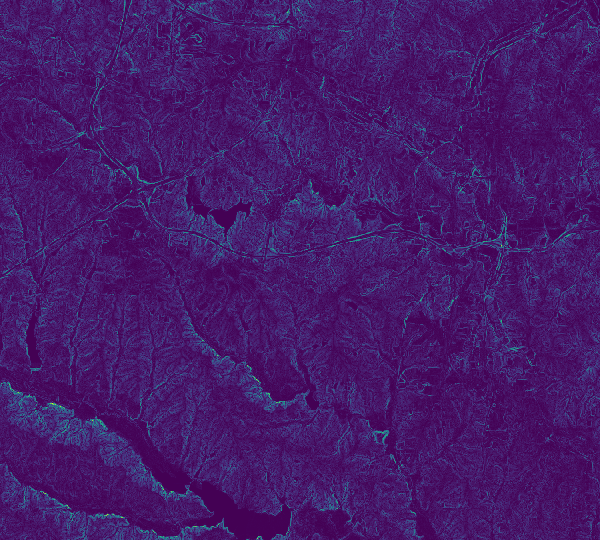
|
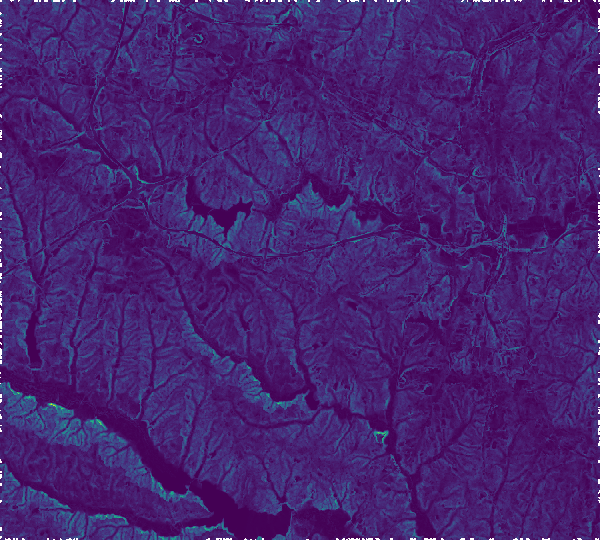
|
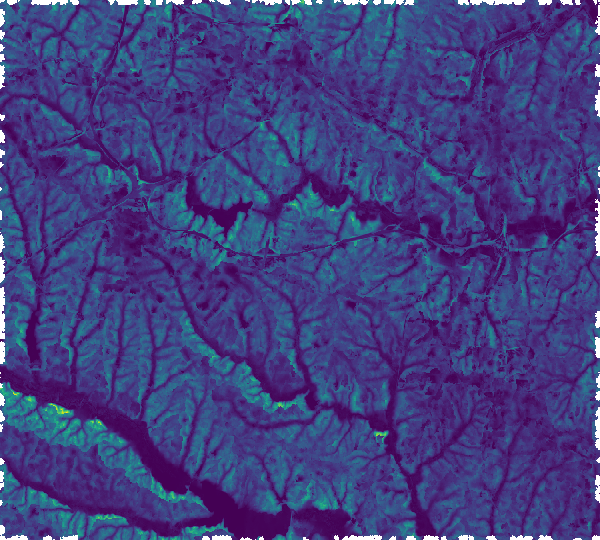
|
| Slope following flow direction for 1 pixel. | Slope following flow direction for 5 pixels. | Slope following flow direction for 13 pixels. |
Slope along a street network at different scales
# Set the computational region
g.region -p raster=elevation
# Convert street network to raster and assign pixels direction value
v.to.rast input=streets_wake type=line output=streets_wake use=dir
# Directions output from v.to.rast needs to be adjusted so that:
# - direction information is coded a steps to neighboring cells
# - direction information always points to next pixel on the line
# (only end pixels of a line should point to NULL cells)
# Deinfe variables
in_dir=streets_wake
tmp_dir=streets_wake_45
out_dir=newdir
# Recode direction information
r.mapcalc --o expression="${tmp_dir}=if(int(round(${in_dir}/45.0))==0,8, \
int(round(${in_dir}/45.0)))"
# Make sure that direction points to next non-NULL cell in network
r.mapcalc --o expression="
${out_dir}=if(${in_dir}==8,if(isnull(${in_dir}[0,1]), \
if(isnull(${in_dir}[-1,1]), \
if(isnull(${in_dir}[1,1]), \
if(isnull(${in_dir}[-1,0]), \
if(isnull(${in_dir}[1,0]),8,6),2),7),1),8) \
,if(${in_dir}==7,if(isnull(${in_dir}[1,1]), \
if(isnull(${in_dir}[0,1]), \
if(isnull(${in_dir}[1,0]), \
if(isnull(${in_dir}[-1,1]), \
if(isnull(${in_dir}[1,-1]),7,5),1),6),8),7) \
,if(${in_dir}==6,if(isnull(${in_dir}[1,0]), \
if(isnull(${in_dir}[1,1]), \
if(isnull(${in_dir}[1,-1]), \
if(isnull(${in_dir}[0,1]), \
if(isnull(${in_dir}[0,-1]),6,4),8),5),7),6) \
,if(${in_dir}==5,if(isnull(${in_dir}[1,-1]), \
if(isnull(${in_dir}[1,0]), \
if(isnull(${in_dir}[0,-1]), \
if(isnull(${in_dir}[1,1]), \
if(isnull(${in_dir}[-1,-1]),5,4),7),4),6),5) \
,if(${in_dir}==4,if(isnull(${in_dir}[0,-1]), \
if(isnull(${in_dir}[1,-1]), \
if(isnull(${in_dir}[-1,-1]), \
if(isnull(${in_dir}[1,0]), \
if(isnull(${in_dir}[-1,0]),4,3),6),3),5),4) \
,if(${in_dir}==3,if(isnull(${in_dir}[-1,-1]), \
if(isnull(${in_dir}[0,-1]), \
if(isnull(${in_dir}[-1,0]), \
if(isnull(${in_dir}[1,-1]), \
if(isnull(${in_dir}[-1,-1]),1,3),5),2),4),3) \
,if(${in_dir}==2,if(isnull(${in_dir}[-1,0]), \
if(isnull(${in_dir}[-1,-1]), \
if(isnull(${in_dir}[-1,1]), \
if(isnull(${in_dir}[0,-1]), \
if(isnull(${in_dir}[0,1]),2,8),4),1),3),2) \
,if(${in_dir}==1,if(isnull(${in_dir}[-1,1]), \
if(isnull(${in_dir}[-1,0]), \
if(isnull(${in_dir}[0,1]), \
if(isnull(${in_dir}[-1,-1]), \
if(isnull(${in_dir}[1,1]),1,7),3),8),2),1) \
,null()))))))))"
# Compute slope of the streets for three
# different step-sizes (step)
r.slope.direction -a elevation=elevation \
direction=streets_wake_dir45 steps=1,5,13 \
outputs=streets_wake_slope_1,streets_wake_slope_5,streets_wake_slope_13
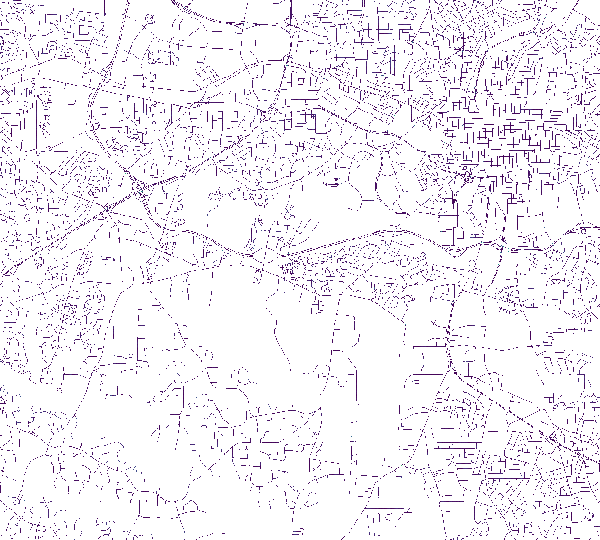
|
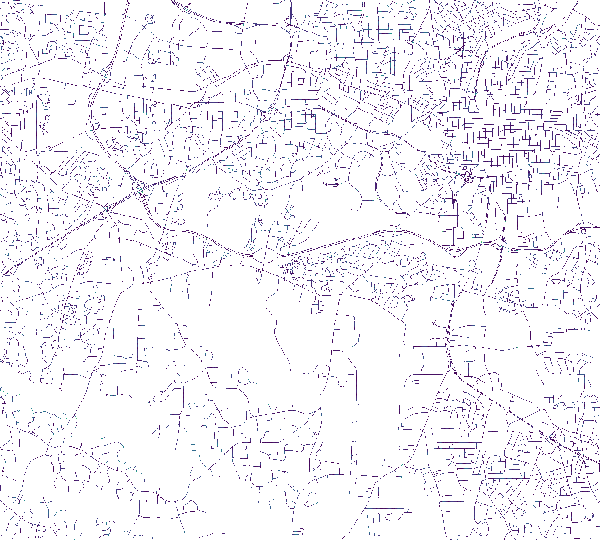
|
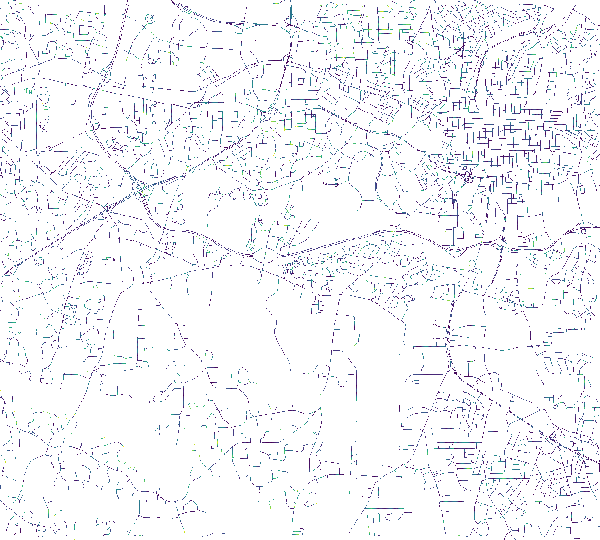
|
| Slope following street direction for 1 pixel. | Slope following street direction for 5 pixels. | Slope following street direction for 13 pixels. |
SEE ALSO
r.mapcalc, r.path, r.slope.aspect, r.stream.slopeAUTHOR
Stefan Blumentrath, Norwegian Institute for Nature Research, Oslo, NorwayWritten for the INVAFISH project (RCN MILJØFORSK grant 243910)
SOURCE CODE
Available at: r.slope.direction source code (history)
Latest change: Wed Dec 22 21:08:10 2021 in commit: e38e18574126d644db1ea232c930fbf98aa552bb
Note: This addon document is for an older version of GRASS GIS that will be discontinued soon. You should upgrade your GRASS GIS installation, and read the current addon manual page.
Main index | Raster index | Topics index | Keywords index | Graphical index | Full index
© 2003-2023 GRASS Development Team, GRASS GIS 7.8.8dev Reference Manual